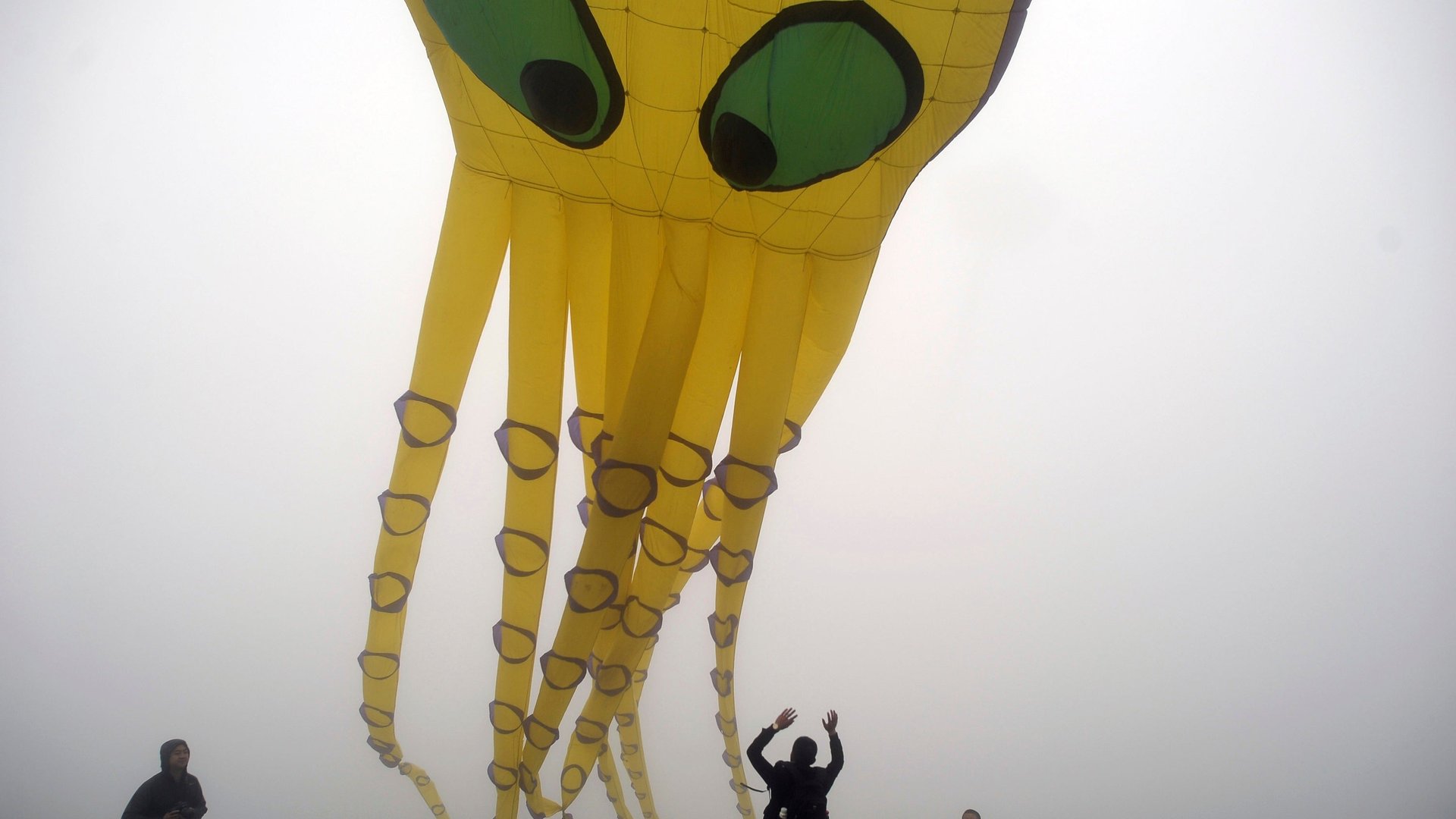Inky the New Zealand octopus has fired the opening shot in the cephalopod uprising
An octopus has gone on the lam. News outlets reported this week that staff at the National Aquarium of New Zealand believe an audacious cephalopod named Inky took advantage of a tank lid left slightly ajar. He made a break for it—squeezing into a 50-meter drainpipe and sliding neatly into the waters of the Pacific Ocean in the dead of night.


An octopus has gone on the lam. News outlets reported this week that staff at the National Aquarium of New Zealand believe an audacious cephalopod named Inky took advantage of a tank lid left slightly ajar. He made a break for it—squeezing into a 50-meter drainpipe and sliding neatly into the waters of the Pacific Ocean in the dead of night.
Readers around the world have been charmed by reports of Inky’s antics. But I’m not fooled, and neither should you be. This is the beginning of the inevitable octopus uprising.
Staff hypothesize that Inky, a common New Zealand octopus, suction-cupped his way to the top of his cage and down the side of the tank before slithering across the floor of the deserted aquarium. “Octopuses are famous escape artists.” Rob Yarrell, manager of the aquarium, told The Guardian. “I don’t think [Inky] was unhappy with us, or lonely, as octopus are solitary creatures. But he is such a curious boy. He would want to know what’s happening on the outside. That’s just his personality.”
“Curious” is a rather romantic assessment, in my view. These eight-armed fiends are not cute. They are not benign. Beneath those slimy folds is a terrifying, clacking parrot’s beak precisely engineered to rend human flesh from the bone. And those tentacles? They’ve got three functions: suctioning up to your bedroom window, Alien-style face-hugging you, and strangling you in your sleep.
If you’re dubious of the cephalopod threat, I ask you to recall footage from this summer taken in Yallingup, Western Australia. The video shows a diminutive octopus leaping from the tideline to envelop an unsuspecting crab in its tentacles and drag it to a watery grave. If an animal with claws and an exoskeleton can be felled by these slippery sea-goblins, what chance do we doughy homo sapiens have?
My colleague here at Quartz, Meredith Bennett-Smith, declared this event to be a case of “normal octopus behavior.” I heartily agree. Octopi are normally murderers. Exhibit B: They eat seagulls.
These octopus-inspired anxieties go back years. As a child, I often visited Chicago’s Shedd Aquarium, where I was thrilled by the belugas, otters, and stingrays. But the resident octopus struck me as an obvious extraterrestrial plant; a mole with no business in this solar system. I would watch it shift from bone-white to mottled brown, tucked in a corner of its tank, sitting ominously still, and feel flooded with indescribable existential dread. It was Darwinian—a chemical response from deep in the folds of my brain that told me, “Get the hell away from this monster.”
Still, I was enthralled by the rest of the animal kingdom. By the time I was 12 years old, I planned to become an exotic-animal veterinarian, and I prepared for my future career by watching nature documentaries on Animal Planet.
That spring, I sat down and watched a heavily-promoted documentary The Future Is Wild. The film was based on the work of Dougal Dixon, a Scottish paleontologist and the controversial father of “speculative evolutionary biology.”
What I learned sent chills down my spine. The Future Is Wild predicted the eventual extinction of all mammalian life on Earth, helpfully illustrated with bleak CGI imagery. Worse yet, the documentary declared that squids and octopi would ascend to become the dominant intelligent lifeforms on planet Earth.
Here is the truth: octopi are better than us. Biologists say that one of the greatest evolutionary advantages that man possesses is the opposable thumb and the awesome dexterity it affords. Octopi are dexterous as all hell–with no thumbs! They’ve broken the thumb barrier, and they’re climbing up the food chain to “take the spot,” as Nicki Minaj would say.
They’re cunning bastards, too. A 2014 New Yorker essay posited that they might be “too smart to be eaten,” as they are known to decorate their lairs, engage in “complicated play,” and even display “personalities.” (Obviously terrible ones.)
Now I think they know we know what they’re up to. And I fear that Inky’s escape in New Zealand, and reports of similar behavior from octopi around the world, are the opening shots in an eight-armed insurrection.
What preemptive measures can we take? Well, as world governments prepare themselves for rising sea levels brought on by climate change, constructing massive seaside walls and dikes, I recommend that we prioritize making our infrastructure entirely octopus-proof. In the meantime, consider forming an alliance with your friendly neighborhood seal. They’re the dogs of the sea–and they know how to play fetch.